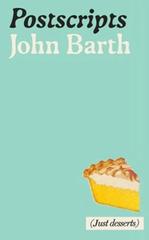 John Barth, "a practitioner and a theoretician of postmodern literature" who contended in a 1967 Atlantic Monthly essay "The Literature of Exhaustion" that "old conventions of literary narrative can be, and indeed have been, 'used up,' " died April 2 at age 93, the New York Times reported. Barth published nearly 20 novels and collections of short stories, three books of critical essays, and a book of nonfiction pieces. His best-known works included The Floating Opera (1956), The Sot-Weed Factor (1960), and Giles Goat-Boy (1966).
John Barth, "a practitioner and a theoretician of postmodern literature" who contended in a 1967 Atlantic Monthly essay "The Literature of Exhaustion" that "old conventions of literary narrative can be, and indeed have been, 'used up,' " died April 2 at age 93, the New York Times reported. Barth published nearly 20 novels and collections of short stories, three books of critical essays, and a book of nonfiction pieces. His best-known works included The Floating Opera (1956), The Sot-Weed Factor (1960), and Giles Goat-Boy (1966).
The Floating Opera, Barth's first book, was "narrated by a character who considers killing himself out of existential boredom before realizing that this choice would be as meaningless as any other," the Times wrote.
The Sot-Weed Factor was "a huge picaresque written in Elizabethan style and laden with puns," the Times observed. "It tells the story of Ebenezer Cooke, the 'sot-weed factor' (tobacco peddler) of the title, who travels through a sinful late-17th-century world with his twin sister and his tutor, struggling to maintain his virtue." Time magazine called the novel "that rare literary creation: a genuinely serious comedy." And critic Leslie Fiedler, who taught with Barth at the State University of New York at Buffalo, called the novel "closer to the Great American Novel than any other book of the last decade."
Giles Goat-Boy was, the Times noted, about "a young man who, having recognized that he is human and not a goat, seeks to promote moral conduct on the west campus of a university and redeem its student body by reprogramming a computer, WESCAC, that dominates that portion of the campus, even while the machine is in a dangerous standoff with the equally threatening EASCAC, a deus ex machina that controls life on the east campus."
Lost in the Funhouse, an experimental collection of short stories, was a finalist for the National Book Award in 1969. Chimera, another collection, won the award in 1973. His last book, a collection of short nonfiction pieces, Postscripts, was published in 2022.
Sometimes criticized for literary gimmicks, Barth "defended his use of postmodern devices like jokes, irony and exaggeration to punctuate, comment on, and even ridicule and undermine a narrative," the Times wrote. "Such techniques, he insisted, provided the tools to replenish and build on what he considered to be the moribund realism of the 19th-century novel."
Barth himself said: "My feeling about technique in art is that it has the same value as technique in lovemaking. That is to say, heartfelt ineptitude has its charm and so has heartless skill, but what you really want is passionate virtuosity."

